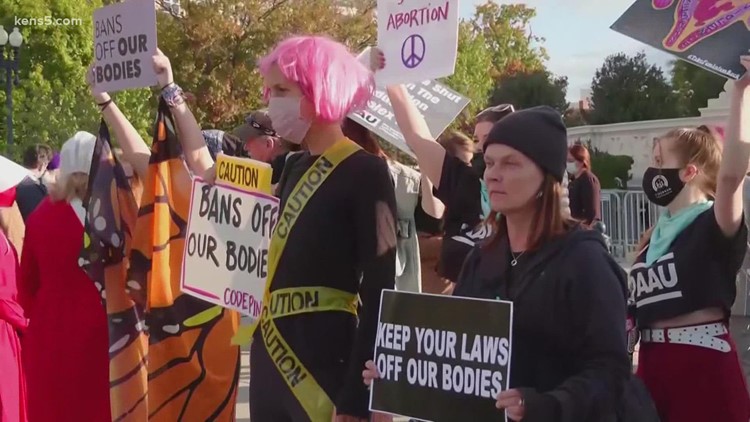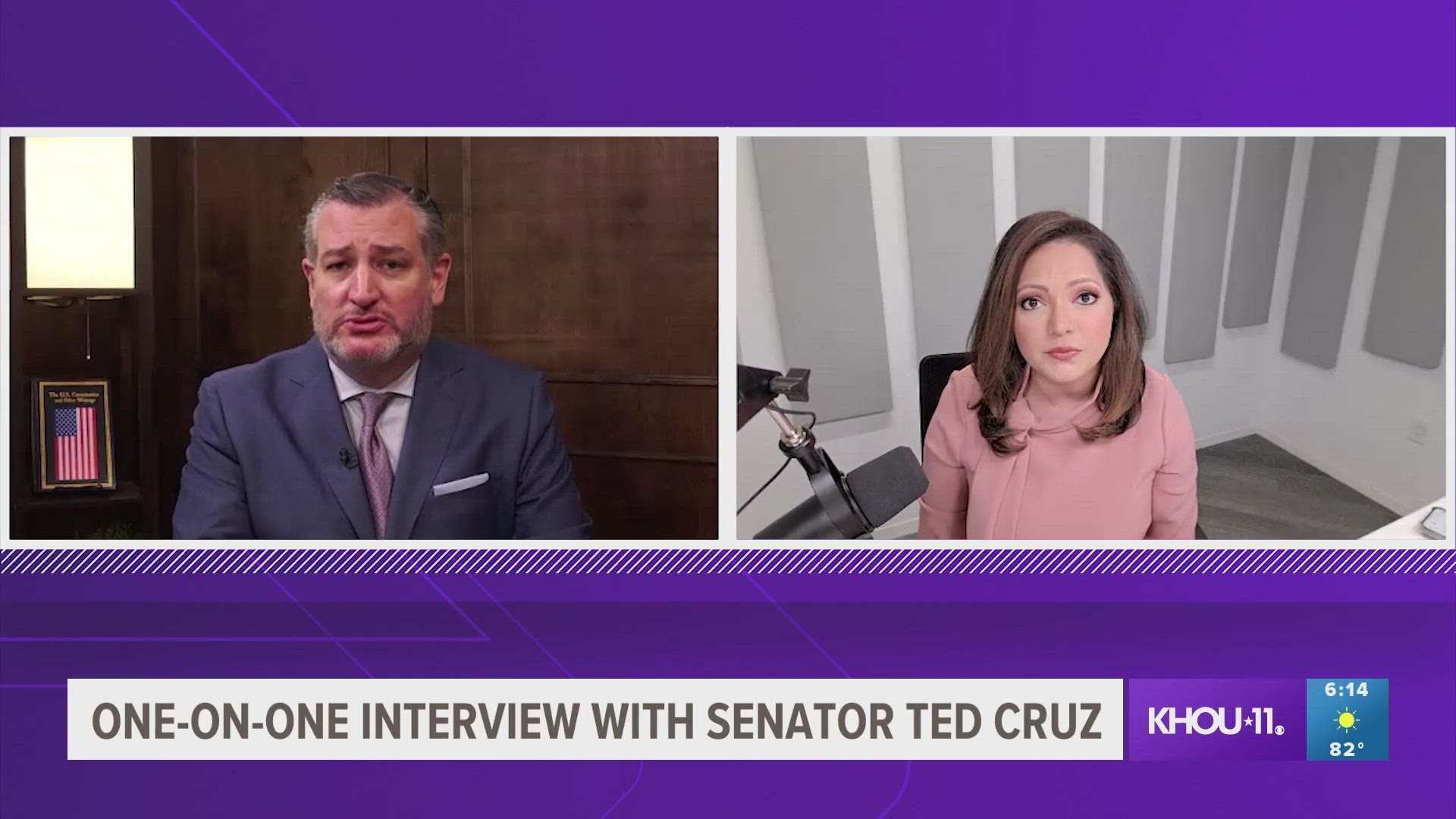AUSTIN, Texas — Abortion-rights advocates have found an unexpected ally in their fight to overturn Texas’ controversial abortion law: gun rights advocates, fearful that the same novel mechanism employed to enforce the statute could later be applied to infringe on gun ownership.
That issue played a key role in oral arguments at the U.S. Supreme Court on Monday, where justices discussed how Texas’ method of implementing its abortion law could put other constitutional rights at risk.
The concern was first introduced in court by the Firearms Policy Coalition, a California-based nonprofit that advocates and defends gun rights laws nationally. The group authored an amicus brief — a type of filing offering information to the court but provided by an entity that isn’t a party to the case — in support of abortion providers, who presented arguments before the high court to block Texas’ abortion restriction law, commonly referred to as Senate Bill 8.
“If Texas’s scheme for postponing or evading federal judicial review is successful here, it will undoubtedly serve as a model for deterring and suppressing the exercise of numerous constitutional rights,” Erik S. Jaffe, a lawyer for the group, wrote in the brief. “New York is already experimenting with private enforcement of anti-gun laws and will no doubt gladly incorporate the lessons of this case to insulate its future efforts to suppress the right to keep and bear arms.”
Six Supreme Court justices stressed the same point Monday — and the lead attorney defending Texas affirmed that he believed the method could indeed be used in laws targeting other rights.
Melissa Murray, a professor at the New York University School of Law, called gun rights advocates’ support for abortion providers a case of “strange bedfellows.”
“It’s like, ‘Today it’s abortion, tomorrow it’s us,’” she said. “I’m sure they see the writing on the wall — if this can happen in Texas, what’s to stop California from doing something on the Second Amendment?”
Although their support might have been shocking at first, she said perhaps it shouldn’t be.
“Taken to its logical conclusion, this kind of enforcement mechanism can basically be used to chill a range of constitutional rights,” she said. “And what is as disfavored as abortion in some quarters? It’s the Second Amendment.”
The Firearms Policy Coalition said Texas’ law was written in a way that could provide a blueprint for other states to restrict gun rights by making it nearly impossible to challenge a state law in federal court.
Jaffe took the argument further, saying that if Texas’ law was allowed to go unchallenged, other states could create “private bounty schemes” to “target persons who marry someone of the ‘wrong’ sex or color, criticize the government, refuse to wear masks or get vaccinated, make negligent or harmless false statements on public issues, or engage in any other protected but disfavored conduct.”
That argument seemed to gnaw at even some of the court’s more conservative members. Justice Brett Kavanaugh said that if Texas’ method of skirting precedent was allowed by the court, it could hypothetically be used by any state to block constitutional rights.
“There’s a loophole that's been exploited here,” Kavanaugh said during the hearing. “It could be free speech rights. It could be free exercise of religion rights. It could be Second Amendment rights — if this position is accepted here.”
Texas’ abortion law has bucked judicial review by making it difficult to sue the law’s enforcers — the traditional route to stop a law from going into effect. To block a law, courts typically issue orders directed to state officials, preventing them from enforcing it. But Texas’ new law forbids state and law enforcement officials from doing just that. Instead, it empowers private citizens to sue those who “aid or abet” abortions, making them the statute’s de facto enforcers.
The Supreme Court on Monday, rather than rule on the law overall, considered arguments so it can answer a more narrow question as part of the lawsuit lodged by abortion providers: Can a state “insulate from federal-court review a law that prohibits the exercise of a constitutional right” by offloading its enforcement to the general public?
Texas’ top Republican officials, who touted the abortion law’s passage as one of the Legislature’s biggest successes of the year, have not expressed any concerns with how the law is enforced. The state’s top three leaders — Gov. Greg Abbott, Lt. Gov. Dan Patrick and House Speaker Dade Phelan — have not commented publicly on the possibility that the law’s enforcement mechanism could be used to limit other rights. None of them responded to a request for comment for this story.
But concerns over the potential propagation of the tactic is a key argument for the law’s opponents. On Monday, in a separate Supreme Court hearing to review the U.S. Justice Department’s challenge to Texas’ law, U.S. Solicitor General Elizabeth Prelogar argued if the justices allow the law to continue, then “no constitutional right is safe.”
The justices have yet to make a ruling but are expected to do so soon. The justices on Monday seemed to lean toward allowing the providers' suit to proceed in its challenge to the law.
While the Firearms Policy Coalition argued that Texas' abortion law could lead to restrictions on gun rights in other places in the country, Texas gun rights groups have kept notably quiet on the subject.
The Texas State Rifle Association, Open Carry Texas and Texas Gun Rights declined Tuesday to comment on concerns that Texas’ law could create a path for other states to restrict gun access.
Their silence illustrates the tricky position these groups are in.
For years, they have fought to loosen the state's gun laws and push back on any attempts to restrict gun access in the state — even after mass shootings that have received national attention. But many of the groups' members and allies in the Legislature are social conservatives, complicating any attempt to speak out against an anti-abortion law that could eventually be copied and become a threat to gun access.
During Monday’s proceedings, Kavanaugh continued to test the state’s perception of the limits of its own law. He posed a hypothetical directly tied to gun ownership rights.
“Say everyone who sells an AR-15 is liable for a million dollars to any citizen,” he began asking Texas’ lawyer. “Would that kind of law be exempt from pre-enforcement review in federal court?”
Texas Solicitor General Judd Stone, after some waffling, answered yes: The courts have no ability to overturn this type of enforcement, he argued, saying Congress could intervene but not courts.
Justice Elena Kagan pushed back on that idea.
“Isn't the point of a right that you don't have to ask Congress? Isn't the point of a right that it doesn't really matter what Congress thinks or what the majority of the American people think as to that right?”
She said if the court continues to allow Texas to skirt judicial review in this way, it will invite other states to violate constitutional rights or federal law whenever they disagree.
“I mean, that was something that until this law came along no state dreamed of doing. And, essentially, we would be like, you know, ‘We're open for business,’” she said. “There's nothing the Supreme Court can do about it. Guns, same-sex marriage, religious rights, whatever you don't like, go ahead.”
Murray said Stone’s assertion that the abortion law’s enforcement mechanism could be applied to limit any right without the ability for courts to intervene was “kind of a stunning concession.”
“But it was a concession they had to make, I think, given just the logic of how they’ve pegged this enforcement scheme,” she said. “It left an opening for those justices who may be on the fence. Not because they have any interest in preserving abortion rights, but because more generally they are concerned about the prospect of rogue states saying there are constitutional protections we don't like and we found a clever way to avoid having to actually vindicate them.”
Murray clarified: Although the fears over this kind of enforcement being used to erode the rule of law in other cases might ultimately motivate some of the conservative Supreme Court justices to rule against Texas, it hardly means the fight to defend abortion rights is over.
Looming over the litigation against Texas' abortion law is another lawsuit that could have even greater implications for abortion rights in the country. On Dec. 1, the court is set to hear arguments in Dobbs v. Jackson Women’s Health Organization, which asks the justices to overrule Roe v. Wade.
If the court, with its conservative majority, votes to overturn Roe, the fight over the law might be largely redundant. Texas already passed a law that would automatically ban abortions if Roe is overturned.
Even if conservative justices who voted before to not block the law change their position, Murray said it would not be indicative of how they might vote to overturn Roe.
“It does not mean that they have abandoned their skepticism of abortion rights,” she said. “It just means they're agreeing to allow this to happen in federal court, allowing this to proceed, which is purely a procedural question.”



